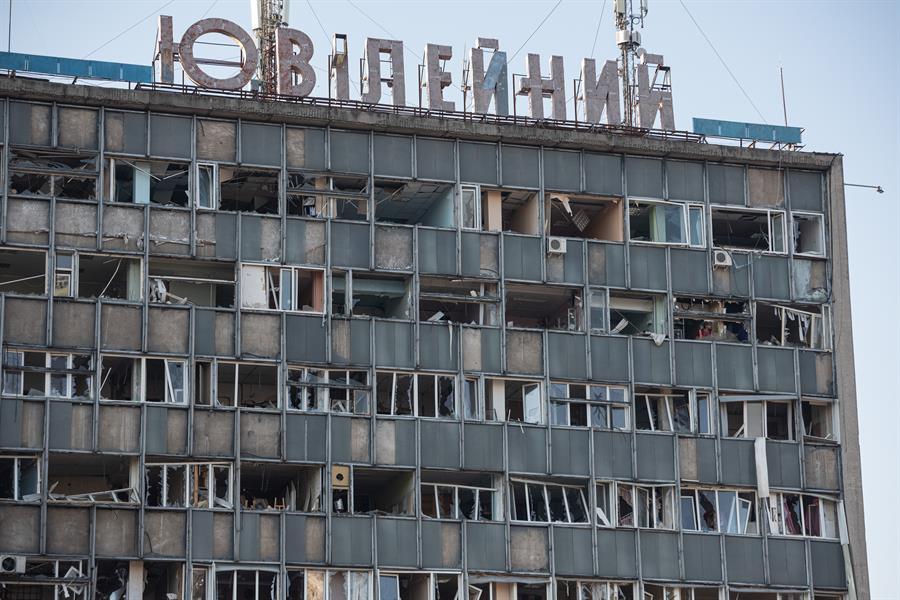
Russian missiles struck Vinnytsia in central Ukraine on July 14, killing at least 23 people including three children, in what President Volodymyr Zelensky called "an open act of terrorism".
The midday attack on the city hundreds of kilometres from the frontlines and invading Russian troops came as EU officials convened in The Hague to discuss war crimes in Ukraine.
The charred remains of upturned cars surrounded by burnt debris were seen in images distributed by officials next to a business gutted by a fire with brown smoke billowing nearby.
In his daily address to the nation late Thursday Zelensky confirmed the toll and said it was likely to rise, with dozens still missing and many hospitalized in critical condition.
"No other state in the world poses such a terrorist threat as Russia," a somber Zelensky said. "No other state in the world allows itself to destroy peaceful cities and ordinary human life with cruise missiles and rocket artillery on a daily basis."
Secretary-General Antonio Guterres said he was "appalled" by the attack, while the EU slammed it as an "atrocity." Both called for accountability.
And Zelensky led a moment of silence before urging European and International Criminal Court officials to open a "special tribunal" into Russia’s invasion.
"I believe it is inevitable that International Criminal Court will bring accountability to those guilty of crimes under its jurisdiction: war crimes, crimes against humanity, genocide."
The ICC in The Hague opened an investigation into possible war crimes in Ukraine just days after Moscow’s forces invaded and it dispatched dozens of investigators to the country to gather evidence.
Russia invaded on February 24 and the conflict has seen thousands of people killed, destroyed cities and forced millions to flee their homes.
"Every day, Russia kills civilians, kills Ukrainian children, carries out missile attacks on the civilian facilities where there is no military target. What is this, if not an open act of terrorism?" Zelensky said after the Vinnytsia attack.
A Ukraine military spokesman said its forces had managed to knock out two from a barrage of cruise missiles that were launched from a Russian submarine in the Black Sea and caused widespread damage in Vinnytsia.
Deadly strikes in central Ukraine have become relatively rare, but the war has raged around cities like Mykolaiv in the south which the presidency said was hit by a "massive missile strike".
"Two schools, transport infrastructure and a hotel were damaged," the presidency said in its morning military update Thursday.
The skeletal insides of one building gutted by the strikes were visible in images distributed by local officials, with municipal workers clearing bricks and rubble strewn after the attack.
The heaviest fighting in Ukraine, however, has focused recently on the industrial Donbas region in the east.
Moscow-backed troops there said Thursday they were closing in on their next target, after wresting control of sister cities Lysychansk and Severodonetsk two weeks ago.
"Siversk is under our operational control, which means that the enemy can be hit by our aimed fire all over the area," a pro-Moscow rebel official, Daniil Bezsonov, was cited as saying by Russian state-run news agency TASS.
In a Ukrainian trench position along the eastern frontline, a 25-year-old soldier who went by the nom de guerre Moryak was working to fortify defences.
"We hide when they shell, we dig when it’s calm," another soldier nearby told AFP journalists.
Delegations from Kyiv and Moscow met in Istanbul this week to discuss unblocking Ukraine’s grain exports.
The meeting involving UN and Turkish officials ended after more than three hours with an agreement to meet again in Turkey next week.
Zelensky said "the entire world" was counting on the negotiations to finalise a deal.
The conflict has pushed up grain prices and Europe is suffering from sky-rocketing energy bills stemming from sanctions on Russia and Moscow’s move to limit gas flows to Europe.
US Treasury Secretary Janet Yellen said Thursday that Russia’s war in Ukraine posed the "greatest challenge" to the global economy, as G20 ministers prepare to start talks in Indonesia.
The European Commission meanwhile slashed growth forecasts for the eurozone, saying the consequences from the war in Ukraine were continuing to destabilise the economy because of record high inflation.
Following concerns about arms being smuggled out of Ukraine to equip crime gangs in Europe, Ukraine’s presidency called on lawmakers to form a monitoring committee that would oversee weapons received from Western allies.
The head of the Ukrainian presidency Andriy Yermak said Thursday all arms supplied by the West are "registered and sent to the front" but such a committee would make the process "as transparent as possible".